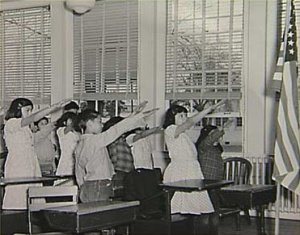
The history of the Pledge of Allegiance doesn't suggest it is something freedom-loving patriots would ever want to repeat. It's for those who believe that "government schools with pledges and flags were needed to brainwash children to embrace nationalism, militarism, and socialism."
It is therefore ironic that the Pledge is now used as a political lightening rod. The phrase "under God" was added to the Pledge in the 1950's; four years a go a federal court ruled that such utterance in a public school was a violation of the First Amendment's separation of Church and State.
That is nonsense, of course. The First Amendment restricts Congress, not the states or local communities, from making laws "respecting an establishment of religion." It is, indeed, the offical state churches that existed at the time which this clause addresses; Congress could neither interfere in a state's religious establishment, nor could it create a national church.
Mainstream opinion holds that the 14th Amendment makes the First Amendment restrictions (and selected other portions of the Bill of Rights) applicable to the states. But the Supreme Court didn't make this interpretation until over 50 years after the 14th Amendment was ratified, in Gitlow v. New York, and there isn't any historical evidence for the validity of this interpretation. Indeed, if the 14th Amendment meant that, it could have said so. (You can see my interpretation of the 14th Amendment here.)
I oppose the Pledge, "under God" or not, but I also know that the Constitution has nothing to say, one way or another, about this issue. It is left for the states and the people to decide. While I think it's a silly issue to make a big deal out of, what with the War on Iraq, booming deficits, and everything, still I think it's good when a branch of government corrects the unconstitutional abuses of another branch. The judiciary has abused its power, and the Constitution provides Congress the remedy. Under article I, section 8, Congress is empowered to create federal courts, and thereby can make rules for them, including the cases they can hear. And in Article III, section 2, it empowers Congress to make exceptions to the Supreme Court's appellate jurisdiciton. With this power, Congress can prevent the federal courts from interfering with state laws and local practices.
And the House has done so, passing a bill to keep the federal courts out of Pledge of Allegiance controversies. One notable passage in the AP story is:
Rep. Dana Rohrabacher (news, bio, voting record), R-Calif., said the effort to strip courts of authority could come back to haunt his fellow conservatives if liberals gain control of Congress in the future. As an example, he said Congress could prevent the Supreme Court from ruling on a state's decision to ban guns.Well, that's right - because the Second Amendment no more applies to the states than does the First.
Am I thus an apologist for government power at the State and local level, or "tyranny of the majority?" Not at all. Am I a worshipper of the Constitution? Of course not. But the Constitution is the law we have. When we pretend it says something it does not, if we just make up its meaning as we go along, we may score victories in the direction of individual freedom sometimes, but at the price of greater federal power. When the Court tells us when we are and are not free, we end up with less freedom. The feds "free" schoolchildren from having to say "under God," while they allow asset forfeiture and regulation of political speech. I'd rather have stupid and tyrannical laws persist at the local level, than have the entire country become a Police State.
It's long past time that Congress employed one of its "checks and balances" against the federal judiciary.




The official state religion in the Commonwealth of Virginia was Epsicopalianism, and a number of Baptist clergymen were arrested back in the early 19th Century. It might be interesting to see the various schismatic sects of Protestantism fight it out for recognition as official state denominations around the country.
ReplyDeleteWe have a pretty good model in the Taliban for what a state under the religious right might be like. Unitarianism or Wicca might make for fun state religions.
Unlike the first amendment, the second has no clause which says "Congress shall make no law respecting . . . " On the contrary, it says RKBA "shall not be infringed."
ReplyDeleteThere are other requirements made on states in the US constitution: a republican form.
I believe this is a point about which there can be reasonable disagreement among "Constitutionalists." However, as a self-identified agorist, I'm a stronger believer in RKBA than the constitution.